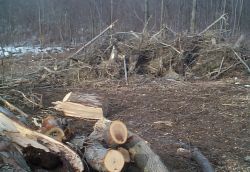Brush and Stump Management
 Storm events, landscape maintenance, and the clearing of land for development are a few activities that generate untreated organic materials (e.g., brush and stumps). DEEP promotes the chipping and reuse of source-separated clean wood as an efficient use of natural resources and to reduce disposal needs at landfills and resource recovery facilities. Chipped land-clearing debris can be used in landscaping applications, as compost bulking agents and soil amendments, and in temporary land stabilization projects in a manner that poses no threat to surface or ground waters of the state.
Storm events, landscape maintenance, and the clearing of land for development are a few activities that generate untreated organic materials (e.g., brush and stumps). DEEP promotes the chipping and reuse of source-separated clean wood as an efficient use of natural resources and to reduce disposal needs at landfills and resource recovery facilities. Chipped land-clearing debris can be used in landscaping applications, as compost bulking agents and soil amendments, and in temporary land stabilization projects in a manner that poses no threat to surface or ground waters of the state.
Treated vs. Untreated Wood
DEEP cautions that only untreated wood is suitable for reuse. Treated wood such as plywood, furniture, wood waste from construction, renovation and demolition, pressure treated timber, painted or stained wood, and any other surface treated wood should not be chipped and reused directly on land or used as a compost bulking agent. Treated wood may contain creosote, lead, acrylic, chromium, pentachlorophenol, phenol-formaldehyde resins, and other known carcinogens and ground water contaminants. Extensive test data on treated wood show lead and other contaminants exceed allowable EPA levels. These pollutants can leach into the ground water or be ingested by children, animals, and adults. For these reasons, chipped treated wood is not suitable for use in compost, mulch, or land application such as highway grading and beautification projects. Treated wood should only be disposed at appropriate solid waste facilities.
Emerald Ash Borer
The emerald ash borer (EAB), an invasive species, specifically targets ash trees eventually killing them. This insect was recently detected in areas of New Haven County. Unfortunately, research has shown that EAB cannot be eradicated. However, there is a strong chance infestations can be significantly slowed with the cooperation of Connecticut’s visitors and residents, especially in the early stages of an infestation. The State of Connecticut Department of Energy and Environmental Protection (DEEP), is committing its resources and experience to prevent the widespread loss of the state’s ash trees. This commitment includes supporting the Connecticut Agricultural Experiment Station (CAES) and its regulatory effort to slow the spread of this invasive insect.
For more information, please read the CT Agricultural Experiment Station's Emerald Ash Borer webpage, and the Emergency Regulations on the Movement of Firewood.
Permitting
To facilitate the chipping of untreated wood for reuse, DEEP has developed general permits that allows certain municipal transfer stations and commercial facilities to process brush and untreated wood. Wood processed at these general permit facilities must be recycled and cannot be incinerated. "Brush" is defined as "tree stumps and cut or broken branches and shrubs." "Untreated wood" is defined as "wood to which no adhesives, paints, stains, fire retardants, pesticides, or preservatives have been applied." Applicants must submit the required paperwork and receive an approval of registration before they can begin operating. In the event of a natural disaster, please visit our Disaster Debris Management Preparedness web page for information on emergency temporary authorizations for handling wood waste.
Individual solid waste volume reduction plant permits are required for facilities that cannot operated within the limitations of the general permits mentioned above. Questions regarding general permits and individual permits can be directed to the DEEP Solid Waste Permitting Program, 860-424-3366.
Clean Wood Processing Facilities
DEEP has a list of clean wood processing facilities in Connecticut.
Another source of wood processors is the CT Department of Administrative Services website. DAS goes out to state-wide bid for many kinds of services that State agencies need. Municipalities and non-profits can use the companies and bid prices/specifications quoted through these contracts. One of the contracts (#14PSX0011; expires 12-31-2017) is for "Rental of Equipment for Tree Trimming, Removal, and Disposal". Questions regarding either contract may be directed to Peter Hunter, DAS, 860-713-5257. Current contracts can be found on the DAS State Contracting Portal Search web page. Even if these contracts do not meet your needs, the list of contractors can be used as a source of service providers.
Composting | Reduce/Reuse/Recycle | Solid Waste Management
Content Last Updated February 10, 2020

